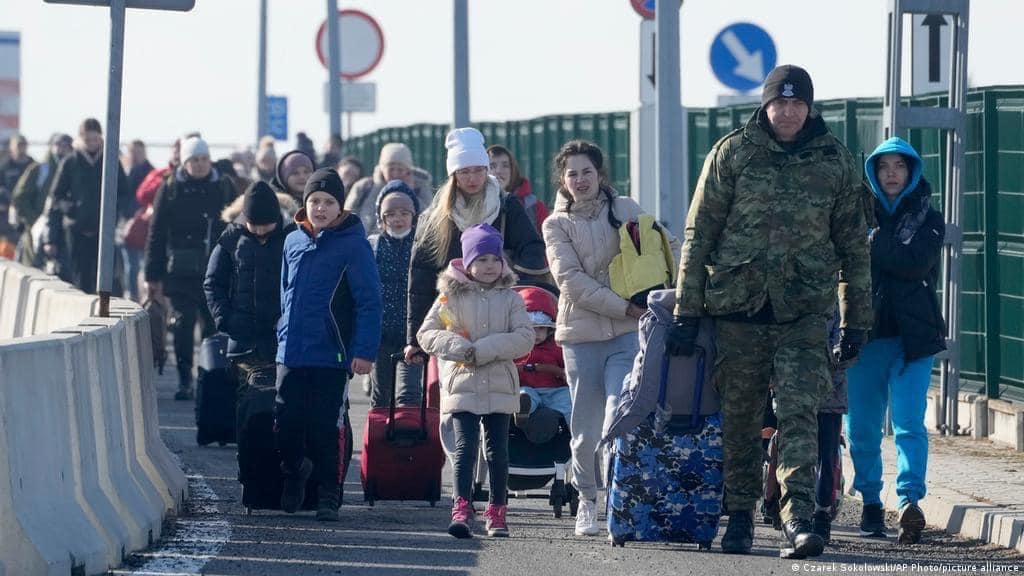 Ukrainian refugees crossing the border into Poland, March 2022. Picture courtesy of Wikipedia.
Ukrainian refugees crossing the border into Poland, March 2022. Picture courtesy of Wikipedia.
The Integration of Ukrainian Refugees Into The EU
The surge of Russian refugees into Europe after the invasion of Ukraine has created a public debate concerning the differentiation between the various groups of refugees entering Europe over the past decade. Ukrainian refugees have largely received a warm welcome into many EU member states since the beginning of the war. However, there is a public debate surrounding the treatment of other refugees which is important to note. On the one hand, millions of Ukrainian refugees are fleeing, and on the other hand, hundreds of thousands of Russian refugees are also fleeing the Kremlin’s war. Nonetheless, there is a third group of refugees that should be considered in light of the current situation, namely African and Middle Eastern refugees.
Statistics show that the largest groups of internationally displaced people originate from countries such as Afghanistan, Eritrea, and Syria. With the recent surge of Ukrainian refugees, research demonstrates that refugees of European descent are treated differently than refugees originating from countries in the Global South. Recently, Norwegian media reported that Norway is creating a class division between Ukrainian refugees and refugees of African or Middle Eastern descent. This claim is supported by government actions, such as giving out free metro cards to Ukrainian refugees, while Eritrean refugees pay full price to use public transportation. International organizations such as Red Cross Norway have expressed concern with the Norwegian government’s favoritism towards Caucasian refugees.
However, being of Caucasian descent does not equal an easy transition into a new life. The Ukrainian refugees who fled their war-torn country to neighboring EU member states are expected to face certain challenges in integrating into these new societies. The integration of Ukrainian refugees is rather different than the integration of an Eritrean refugee who seeks permanent asylum. This is because most Ukrainians do not know how long they will be in their host nation due to the uncertainty of the war, and face lower barriers to an eventual return. The integration of the 7.6 million Ukrainian refugees into the EU has proved a rather difficult task, although it has unfolded in a less controversial manner than the previous acceptance of Middle Eastern refugees.
Currently, Ukrainians are seeking refuge in Poland, Germany, and the Czech Republic. During the height of the refugee crisis, Poland, Italy, and Greece were reluctant to accept Afghan and Syrian refugees. Oftentimes, there were various attempts to halt the influx of refugees, such as ill-treatment at the borders and efforts to send refugees back, purely because of their ethnic origins. In Poland, Ukrainian refugees are finding jobs and integrating into society, ultimately boosting the Polish economy and growing their workforce by 0.5 %. The Organization for Economic Cooperation and Development (OECD) reported on the contribution of Ukrainian refugees to the European workforce, which is estimated to boost the economies of many EU member states.
However, data from multiple OECD countries show that language barriers are among the most common hurdles Ukrainians face when fleeing to a new country. Nevertheless, many Ukrainians already had work permits for EU countries before the war, with 1.3 million Ukrainian citizens already conducting work in countries such as Poland and the Czech Republic. Thus, the integration of Ukrainian refugees into the EU can be easier than the integration of other refugees coming from countries with weaker ties to the EU. When comparing Ukrainian refugees to other refugees, the aspects of race and geopolitics matter. Ultimately, Ukraine has close diplomatic ties to its neighboring countries that are part of the EU, which is not always the case for refugees fleeing authoritarian states such as Syria.
Russia is an authoritarian state and aggressor that the EU almost unanimously stands against. U.S. allies in Europe have taken the burden of accepting refugees, even though President Biden announced that the U.S. would welcome 100,000 Ukrainian refugees. The United Nations estimates that in the coming years, refugee crises will occur more frequently than they have in past decades. Accordingly, handling refugee crises humanely should continue to play a crucial part in American security policy. The U.S. could even take note of the policies enforced by the EU during times of crisis, in order to learn best practices and avoid mistakes in the speedy processing of refugees. As part of that, there should be a firm understanding that refugees should be treated in an equitable manner, regardless of their country of origin to sustain human decency and support the principles of security and peace.





